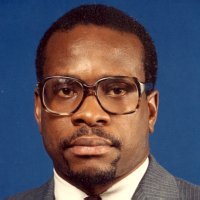My Grandfather's Son
The book spans all of Thomas's life to the present, beginning with his early childhood in the Deep South and his mother's decision to send him and his brother to be raised by her father and stepmother as she felt unable to care for them.
Although the memoir offers little of Thomas's emotional distress over divorcing his first wife, it expounds on his intellectual evolution to conservatism, and the financial troubles that plagued him up through the late 1980s.
"[3] Thomas received a $1.5 million advance for the book, which hit number one on the New York Times non-fiction best-seller list.
[7] In first grade his mother sent him and his younger brother to live with his maternal grandfather, Myers Anderson, and his wife Christine in Savannah.
[1] Anderson, who Thomas and his brother came to call "Daddy", ran a small fuel oil business and kept a strict household.
[8] Thomas excelled academically and socially at Holy Cross, graduating with honors and marrying his long-term girlfriend Kathy Ambush shortly after.
[4] My Grandfather's Son continues to follow Thomas's career, including a stint at the legal department of Monsanto Company and his 1979 move to Washington, D.C. to work for then-Senator Danforth.
[2][10] Throughout this period Thomas made an intellectual journey from libertarian to conservative, culminating in changing his party registration to Republican in 1980.
[12] When the hearings began on September 1, 1991, Thomas expected them to center on race and claims to have had no advance information about Anita Hill's accusations.
[12] Thomas says he learned of the accusations of sexual harassment by Hill over the weekend after the first five days of the hearings when a pair of FBI agents visited his home.
[13] William Grimes, in his book review for The New York Times, describes Thomas' writing of his time at the Equal Employment Opportunity Commission under President Ronald Reagan (which, Grimes writes, made him an 'object of contempt and derision for mainstream civil rights organizations") as "adopting a defensive crouch, lashing out at his enemies, reopening old wounds and itemizing insults that should be forgotten."
Grimes describes Thomas' treatment of the Anita Hill affair as a portrayal of "himself as a persecuted, almost Christlike figure singled out by the liberal establishment, at the behest of his civil rights enemies, not just for criticism but also for total annihilation.
It’s by only reading this book will you understand how somebody with a third grade education taught a Yale Law School graduate and Supreme Court Justice so much about life, and yes even conservatism.
